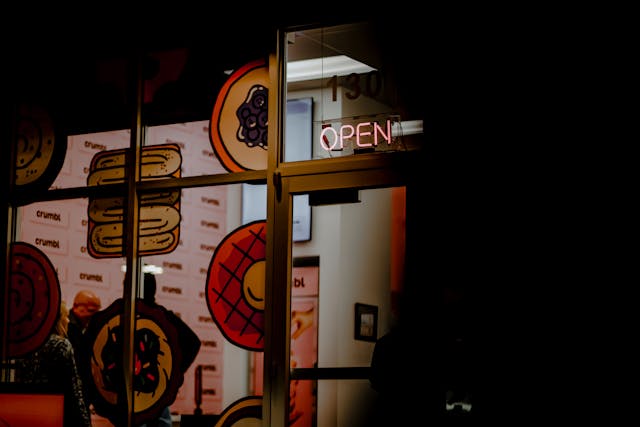Why is crumbl closed on Sundays: Understand how Crumbl’s Sunday closure supports employee well-being, brand strategy, and customer excitement.
When you think of Crumbl, what comes to mind first? Giant pink boxes. Cookies are so heavy they practically bow the box. Weekly rotating flavors that spark debates and cravings in equal measure. But then comes that one frustration many fans share: the doors are locked every Sunday. No snickerdoodle run. No midnight cookie dash. Just silence. Understanding why requires looking at business operational decisions that prioritize values over profits, a rare move in today’s retail landscape.
And that’s not by accident. Crumbl’s choice to stay closed on Sundays is one of the most intentional moves in their entire playbook. It might feel counterintuitive for a rapidly expanding franchise to shut down at peak weekend demand, but beneath that silence lies a deeper purpose. Let’s explore exactly why Crumbl closes on Sundays, and why the answer is far more layered than “because they can.”
What You'll Discover:
The Philosophy Behind a Weekly Pause
A Day Reserved for the People Who Work There
At its core, Sunday closures are about people. Not customers, not profits, employees. The founders believed from the start that business should never steamroll over the people who make it possible. That’s why every Crumbl location shuts its ovens one day a week to give staff breathing room.
Think of it this way: a cookie is only as good as the energy of the baker who created it. An overworked, drained employee will struggle to pour that same spark into the dough. By protecting Sundays, Crumbl creates space for staff to live full lives, whether that’s spending time with family, catching up on rest, or finally tackling that laundry mountain at home.
A Statement Beyond the Bottom Line
Many businesses stretch hours into every available crevice of the calendar. More hours, more sales, more revenue. Crumbl breaks that mold. Closing Sundays signals a refusal to let profit be the only metric of success. Instead, the brand leans into balance, showing that values and humanity can sit at the center of operations.
The Ripple Effects of Closing One Day
Rested Crews Make Better Cookies
This move isn’t just benevolent, it’s practical. Employees with a guaranteed day off show up sharper, friendlier, and more energized. That translates directly into fresher service, tighter operations, and ultimately, better cookies on the counter.
Scarcity Creates Cravings
Here’s where things get fascinating: absence stokes demand. By closing Sundays, Crumbl actually builds anticipation. Fans know the weekly menu reveal drops on Sunday evening, but they can’t get their hands on the flavors until Monday. That intentional gap creates buzz. Instead of business trickling evenly, Monday becomes an event. People line up not only for cookies but for the sense of ritual and excitement that the weekly reset creates.
A Cultural Undertone
Crumbl was born in Utah, a place where the rhythm of Sunday carries cultural weight. For many, Sunday is a day of rest, reflection, and family. While the brand has expanded nationally, that DNA remains intact. Closing Sundays isn’t framed as religious dogma, it’s a nod to the deeper cultural fabric from which the company grew.
Fans Weigh In
Walk through Crumbl discussions online and you’ll see a mix of reactions. Some fans sigh dramatically about not being able to grab cookies on game day. Others nod approvingly, pointing out that workers deserve a guaranteed break. A lot of people even compare it to Chick-fil-A’s model, another wildly successful food brand that thrives while closing every Sunday.
In short, the conversation mirrors Crumbl’s own balance: frustration mixed with respect, but always underscored by loyalty.
Strategic Benefits You Might Not See at First
Operational Simplicity
Closing on Sundays does more than reduce employee burnout. It trims costs. One less day of operations means one less day of staffing schedules, inventory ordering, and logistical juggling. For a franchise owner, that’s predictability, a gift in an industry built on chaos.
Marketing Momentum
The absence of Sunday sales is offset by the marketing advantage. The brand leverages its closure as a storytelling tool. “We care about people over profits.” “We value balance.” It’s not only authentic but also marketable. Customers don’t just buy cookies, they buy into the values behind them.
Retention Over Recruitment
The food service industry is notorious for high turnover. Burnout drives people away faster than any pay raise can fix. But with Sunday closures, Crumbl offers something rare: stability. That builds long-term loyalty among staff, which in turn reduces training costs and strengthens the overall culture.
Why This Model Works in Today’s World
If Crumbl had tried this in the hyper-consumerist boom of the early 2000s, it might have flopped. But in today’s climate, people are hungry for brands with boundaries. The public is increasingly skeptical of companies that wring every ounce of labor and attention out of workers and consumers.
By standing firm on Sunday closures, Crumbl resonates with those seeking businesses that respect balance. It’s a subtle rebellion against the “always open, always consuming” grind. And paradoxically, that makes Crumbl even more appealing.
Key Takings
- Crumbl closes on Sundays to prioritize employee well-being and protect work-life balance.
- This practice strengthens service quality by ensuring rested, energized teams.
- The closure creates scarcity and anticipation, turning Mondays into high-demand events.
- The decision reflects cultural roots and values, not just business strategy.
- Operationally, Sunday closure reduces costs and simplifies management for franchise owners.
- Employees gain stability and loyalty, reducing the high turnover common in food service.
- Customers interpret the closure as authentic value signaling, which deepens brand loyalty.
Further Reading:
- The Business Strategy Behind Chick-fil-A’s Sunday Closure: How closing on Sundays, motivated by values, creates employee rest opportunities and brand loyalty, turning the fast-food chain into a values-driven powerhouse.
- Employee Burnout and the Power of a Day Off: Explains how mandatory rest days reduce burnout, increase retention, morale, and productivity by promoting health and work-life balance.





